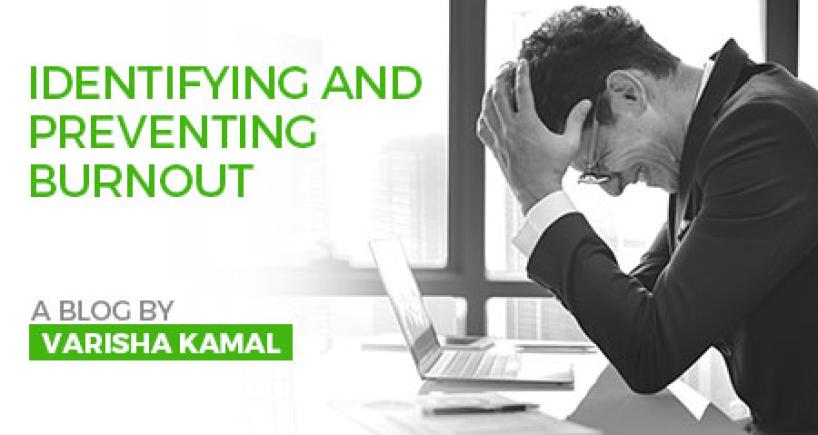
Identifying And Preventing Burnout
If constant prolonged stress is making you feel exhausted, overwhelmed, cynical, emotionally drained you may be on the road to burnout. Learning how to regain your balance and feel pragmatic and optimistic again can help you cope with the burnout.
First, let's start by understanding what is Burnout?
It is the result of prolonged excessive stress which makes an individual emotionally, physically, and mentally exhausted. Constantly being emotionally drained, overwhelmed leaves an individual discouraged, saps individuals’ energy and makes them less enthusiastic.
Common signs and symptoms of burnout?
- Starting to view the responsibilities as increasingly stressful and frustrating.
- Emotionally distancing yourself
- Constant feeling of fatigue
- Lacking the energy to do any task
- Difficulty in concentrating
- Reduction in your overall performance
- Low productivity
- Failing to take care of your needs
- Experiencing muscle tension, Headache stomach aches, or intestinal problems.
- Using food, drugs, or alcohol to cope
- Unable to make decisions
How can you combat burnout?
If you have started to recognize the burnout signs and symptoms or you’re on the breaking point, trying to push through exhaustion, it will only lead to emotional and physical disturbance. Learning the right way to overcome can help you be healthy and positive again in your life.
It’s essential to know that dealing with burnout requires:
“R” Approach:
Recognize: Recognising the warning signs of it. Increasing self-awareness. Reverse: Help yourself manage it by seeking support or learning effective skills to manage stress. Resilience: Building resilience and learning effective skills to be resilient can help balance your life and can help you regain your energy, focus, and sense of well-being.
1. Find the source: It becomes difficult to change when you don’t know exactly what needs to be changed. Identifying why you’re feeling overwhelmed, inattentive, exhausted, resentful, and exploring the contributing factors affecting your mental and physical health can help you understand the root of the problem.
The causes of burnout can be:
- Work-related such as feeling the loss of control in your work-related decisions, exceedingly demanding expectations at work, monotonous and unchallenging job, lack of reward and recognition for good work, chaotic pattern or a high-pressure environment.
- Lifestyles: working too much without relaxing or socializing, lack of support and close relationships, taking too many responsibilities without enough help, not sleeping properly.
- Personality traits: perfectionism, pessimistic views about yourself, high achieving personality type.
These causes can easily overwhelm and exhaust if not recognized and taken the necessary steps.
2. Identify the changes you can implement: After recognizing the sources you would be able to understand where you can make small changes, where you need to take a break to prevent burnout. Recognize a few ways to reduce your load right away. If you can’t change some aspects of your lifestyle try to find solutions to mitigate them. Write down the ways you can eliminate or manage stress.
3. Re-evaluating your priorities: Burnout is an undeniable sign that something is not working healthy in your life. Thinking what is needed at the present moment (Setting Boundaries, taking a break, good sleep), discovering what makes you happy, taking out time to reflect on your past decisions and responsibilities. Setting boundaries: It's a crucial aspect of mental health and well-being. Learning to say “no”, naming your limits, and practising self-awareness.
Taking a Break from technology: Setting a timer for yourself where you keep yourself away from technology. No laptop, no emails, no social media.
Exploring your creative side: Trying something new, trying to do things that make you happy and interest you, starting fun projects and resuming your favourite hobbies.
Getting good sleep: Feeling tired can also exacerbate burnout which can further cause you to think irrational. Taking 7-8 hours of sleep can help you relax and refresh for the new day.
4. Exercise: It can be a powerful antidote to burnout and stress. Even if you don’t feel like doing exercise, push yourself and aim to exercise for at least 30 minutes every day. Try walking, weight training, swimming, running, dancing, martial arts, etc. Do movement rhythmic exercises where you move your arms and legs which is highly effective to uplift your mood, makes you focus, energetic and acts as a good stress buster.
5. Healthy Diet: What you eat can impact your mood and energy level. Eating a healthy diet can have a good impact on your physical as well as mental health. Processed foods can quickly lead to low energy and mood. Lessen caffeine intake and avoid smoking, as it can seem to calm you but affects your levels of anxiety and stress.
6. Reach out for support: Problems can seem unconquerable when you're burned out, it gets difficult to get the energy to have a healthy balanced life again. It can be overwhelming sometimes to determine how to address problems, how to identify solutions when you’re exhausted. Involving a person, you trust can help you feel supported, gain a different perspective of the problems, and brainstorms different solutions. Join support groups, it can help you learn different new strategies to manage your daily stressors. Limit your contact with people you think are exploiting your boundaries. Moreover, if you think you’re not able to help yourself reach out for professional help.
Categories
Clear allMeet the doctor

- Mental Health and Behavioural Sciences | Clinical Psychology
-
4 Years
-
700



















